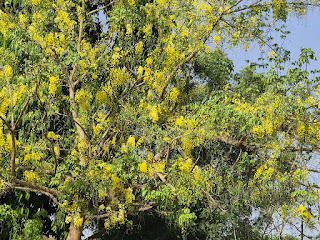 |
| Amaltas on a road divider in Delhi: Photo by Sanjay Gupta |
When people say, “May heaven's choicest blessings be showered upon you”—a popular wish, spoken frequently at weddings—they could be visualizing amaltas, also known as “the golden shower tree.”
This yellow beauty wears multiple monikers. Indian laburnum and Cassia fistula (the botanical name) are fairly well known. Somewhat less common, but more significant from historical and health points of view, are Aragvadha (meaning disease killer) and Rajavriksha (the royal tree)—both of which find mention in Charaka Samhita, the oldest Indian treatise on Ayurveda.
There are several other names, too. But I'm particularly fond of amaltas and how easily it rolls off your tongue with a lyrical feel: amal-taas.
Different parts of this tree provide different medicinal benefits. It is said to have anti-inflammatory and laxative properties, and is useful in arthritis and skin diseases, among other ailments. Killer of diseases indeed!
For me, amaltas represents soothing drops of nectar sent from above for the benefit of parched souls. Especially for Delhiites sweating it out in the scorching days of May and June.
The signs of delicate yellow on slender, otherwise-nondescript branches of the medium-sized tree begin to appear in April. Come May and the golden shower works its magic everywhere. On trees planted along traffic dividers. In clusters across city parks. In fortunate folks’ backyards. Just about anywhere.
Take one look at the pleasant flowers twinkling invitingly and the heat that has been oppressing you relents a bit. Pause a little longer to drink their blessings and a cool reassurance percolates in your being.
In the sweltering afternoons of harsh city life, the relief that sightings of amaltas bring to me—and countless others I'm sure—is immense. The yellow petals, swaying in the wind, make your spirit soar and put the bounce back in your step.
Trees remain Nature’s most benevolent, most visible marks on a rapidly deteriorating Earth. Let’s give a shout-out to one of their most lovable manifestations.
“Love you, amaltas!”

No comments:
Post a Comment